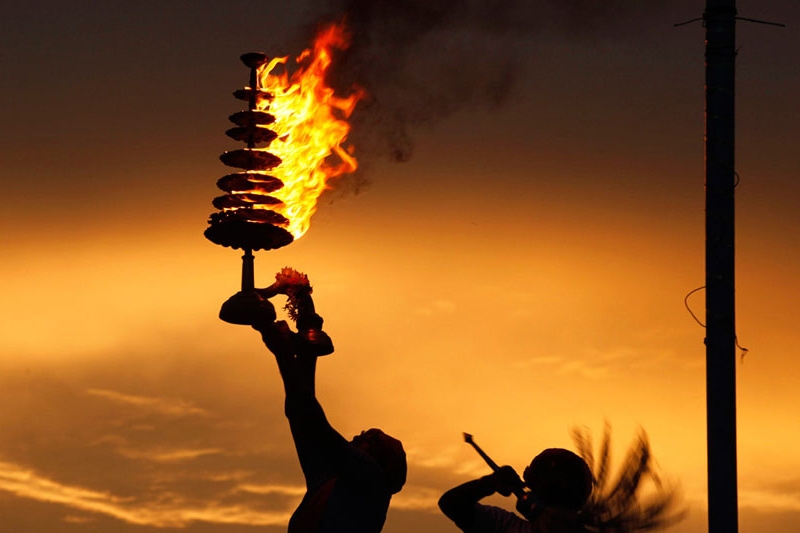
Hindus worship God in His various forms as well as the formless aspect of God, as Hinduism teaches ‘there is nothing but God’, that is, ‘God is everything’. The authenticity of Hinduism is that it sees God in everyone and everything. In Hinduism there is no indoctrination to become a believer, as in other semitic religions. Some Hindus may worship a certain form of God for specific reasons, such as Sri Ganesh is worshipped to remove obstacles, Sri Dattatreya to overcome ancestral souls’ (pitar/poorvaj) trouble, the Mother Goddess to acquire Divine Energy (shakti) and supernatural powers (siddhi), etc.
Hinduism represents limitless depths of profundity, a rich history and an elaborate theology. There is perhaps no religion in the world that is more variegated or ornate. Mythology is openly admitted within Hinduism, which possesses elaborate myths used to explain the personalities and natures of the gods. Hinduism accepts idol worship with open arms as a simple way of expressing one's faith, love and devotion to God. There is a childlike innocence and purity of approach when a person stands reverently in front of an idol and bows before it in total submission.
Hindu idols were subjected to desecration and vandalization by the Muslim armies in medieval India. For reasons unknown, the gods remained silent and offered no material help. But, strangely, while all this was going on, the bhakti (the path of devotion) movement, of which idol worship was an integral part, was gaining ground throughout India, offering solace to millions. No amount of external violence and desecration of the temples could shake the faith of the Hindus in their gods and goddesses and their sense of justice.
The idol is just a symbol, a form, with which the mind can be connected and concentrated upon. The ultimate reality is beyond the senses, beyond the known field of illusion or maya. Sometimes as recorded by human experience, the idols do respond and converse with man, if there is enough devotion in the heart of a devotee, God responds to him with a direct response. The lives of Mirabai, Sant Tukaram, Shri Ramakrishna Paramhansa and et al are a few instances. They proved beyond doubt that idol worship has its own brighter side and through simple faith and intense devotion one can realize God through it.
The Vedic Aryans did not worship idols though they invoked various gods through performance of sacrificial rituals. The practice of idol worship came into existence probably when many new tribes were incorporated into the Aryan society and some of their practices including the worship of idols were accepted by the former as an acceptable form of worship. The practice became popular during the Mauryan period when idols and temples started appearing in various parts of India. The Guptas were great worshippers of Vishnu and built many temples in His honor.
There is no doubt that idol worship is a superior form of divine worship, a very simple way of uninhibited declaration of man's faith in God.
A few insights into why a devout Hindu worships his idols so dearly.
1.   It is the easiest way to install faith and devotion.
2.   It is a way of acknowledging the omniscience and omnipresence of God. If God is omnipresent, then everything in the universe, including the idol one worships, is filled with His energy and presence.
3.   The Hindu epics and puranas are full of instances where many devas, asuras and human beings obtained boons from God after worshipping Him in a particular image.
4.   Idol worship gives immense freedom to an individual to worship God in his own way.
5.   The idols help the devotee to become deeply religious.
6.   A devout Hindu goes to a temple and worships his favorite deity to charge himself with religious currents and keep himself going for days together amidst busy worldly activity.
7.   It reinforces his faith in God and his confidence to face the difficulties in life.
8.   Once installed in the house or in a puja mandir (place of worship in a house), the very house becomes a place of God's residence, a very sacred place, a temple by itself. The image that stands there reminds the devout members of the household to become constantly aware of the divine presence amidst them and of their religious duties and responsibilities.
9.   It inspires devout men to keep their houses pure and clean and not to indulge in sacrilegious acts.
10.   Aid to concentration: More than any abstract concept, an image or a symbol (yantra) is the best aid to concentrate and control one’s mind and attention.
11.   By keeping the mind concentrated on a particular image, the mind can be stabilized.
12.   In idol worship the "true" worshipper becomes God! The idol stands symbolically for the whole process of creation.
13.   The idol is no doubt inert and inactive piece of matter at the physical level, but in his mind, the devotee can pour his devotion and thought energies into it and bring it to life and derive inspiration and guidance from it. This is exactly what happens when someone worships a deity deeply and devotedly.
14.   When an idol is worshipped with intense love and devotion, almost a similar process takes place in the mind of the worshipper.
15.   The idol, which is physically inert and unmoving, becomes alive and active at least in his thoughts and dreams.
16.   The idol reminds one of the ephemeral natures of our existence.
17.   The idol reminds a devotee of his or her own body. The gross body, which is the outer aspect of one’s existence, is not much different from an idol as long as it is not suffused with divine light and divine consciousness.
18.   It is the best means of silent communication.
19.   Idol worship is more effective than a prayer.
20.   Idol worship helps us to concentrate the energies that emanate from a prayer into one strong flow of current in one particular direction.
21.   God is far and above, vastly unknown or known only through glimpses and symbols. The ordinary individual who is a slave to his senses and desires can never come face to face with Him. How can He be known by him who is beyond the senses, the mind, the words and even one’s own intelligence (buddhi)?
22.   The devotee creates an image of Him in his mental world and worships him expressing his gratitude and his deep devotion.
Each idol is a representation of a Deity or Divine Energy. There are millions of Divine Energies and aspects of the Divine, each with a specific Divine function in the universe. For example, the specific Divine function or main Divine aspect of Brahma is Creation (utpatti), while that of Sri Vishnu is Sustenance (sthiti) and of Shiva is destruction (laya.)
According to Hinduism the worlds and beings came into existence when Purusha (Divine Will and consciousness) entered Prakriti (Nature, Energy or Matter). The forms and ideas already exist in the consciousness of Hiranyagarbha (the world soul) and He brings them to life by pouring into them His essence. The world (Viraj) was an idea until the life breath entered into it and brought it to life. The word "jagat" (the world) means that which is bright, awake or conscious.
Worship of God is worship of self. It is also not known to many that when a devotee worships an idol in the most traditional manner, first he transfers a part of his prana (life energy) into the deity (sometimes variously to the water in a pot, a yantra or a lump of sandal paste etc.,) and thereafter worships it as if it is a living and breathing deity, giving to it all the respect due to God as per the scriptures and laid down procedures.
According to Hinduism, man is verily divine. He is the microcosm, the very Brahman in his aspect as Atman. All the divinities exist in him. All the powers too. Actually when he is worshipping the idols, praying in front of them, he is invoking the divinity within himself to wake up and liberate him. When a devout Hindu folds his hands in front a deity, and prays, his hands point to both the deity in front of him and the deity that reside in his heart, thus symbolically representing the fact that worship of deity is also worship of the divinity that exists in oneself.
Modern science is slowly unraveling the secrets of the mind and its capacity to manifest reality. It is now a widely accepted fact that mental images and forms one entertains in one’s mind greatly shape one’s life and destiny and that the mind (especially the subconscious part of it) has the capacity to realize whatever form or symbol it concentrates upon. The ancient Hindus were aware of the potentiality of the mind and therefore they did not object to the worship of idols. They knew that it is one of the best ways to lead the otherwise fickle human mind towards God.
No religion can arrogate to itself the ownership of God or the status of a true religion condemning others. The paths to God are many and many are the ways one can reach to him. No one can doubt it or question it.
The advice from the Isa Upanishad is "Into blinding darkness enter those who worship ignorance and into still greater darkness those who worship knowledge alone. He, who knows both knowledge and ignorance together, crosses death through ignorance and attains immortal life through knowledge."
Idol worship helps the human to identify him with the almighty and helps him to concentrate in his prayers. Idol is an absolutely right media for the human to connect with the God. Even though the idols represent numerous figures, Hinduism or Sanathana Dharma believes in “Ekam Sat Vipra Bahuda Vadanthiâ€, means, everything leads to one, the ultimate truth, the almighty which is formless, shapeless, colourless, odourless, and invisible and is also omnipresent.
By Premji



















